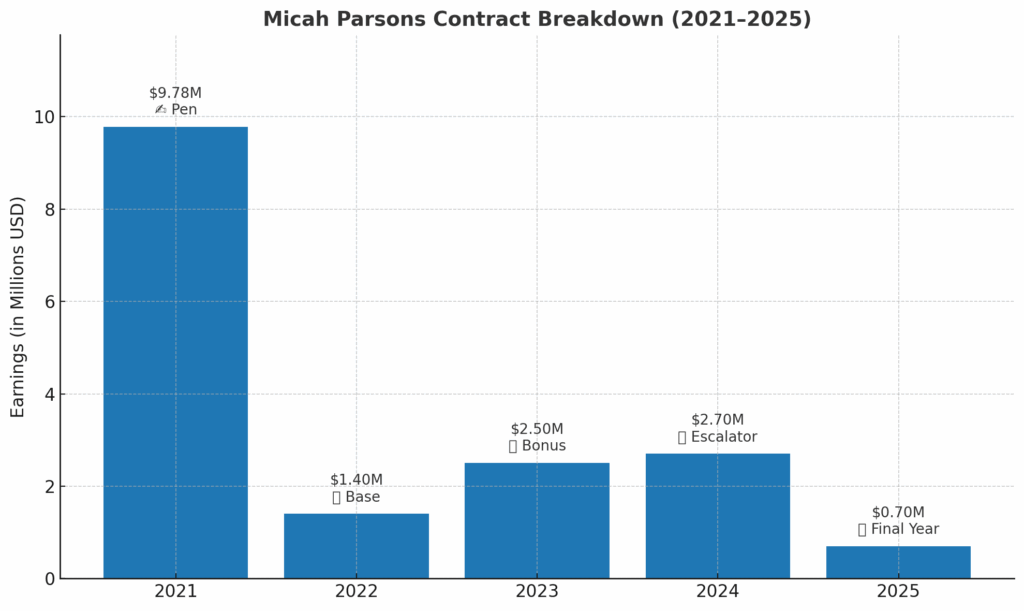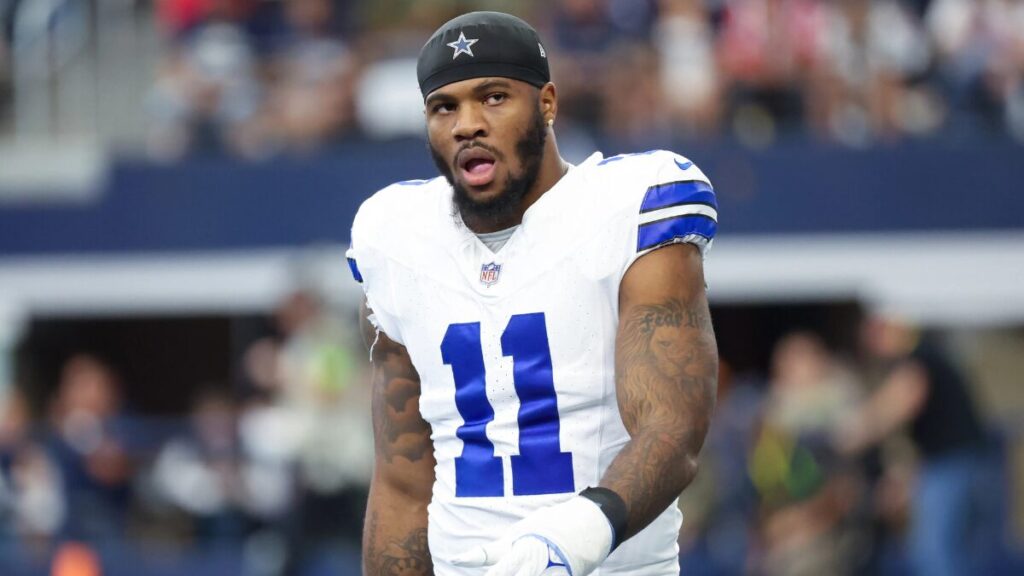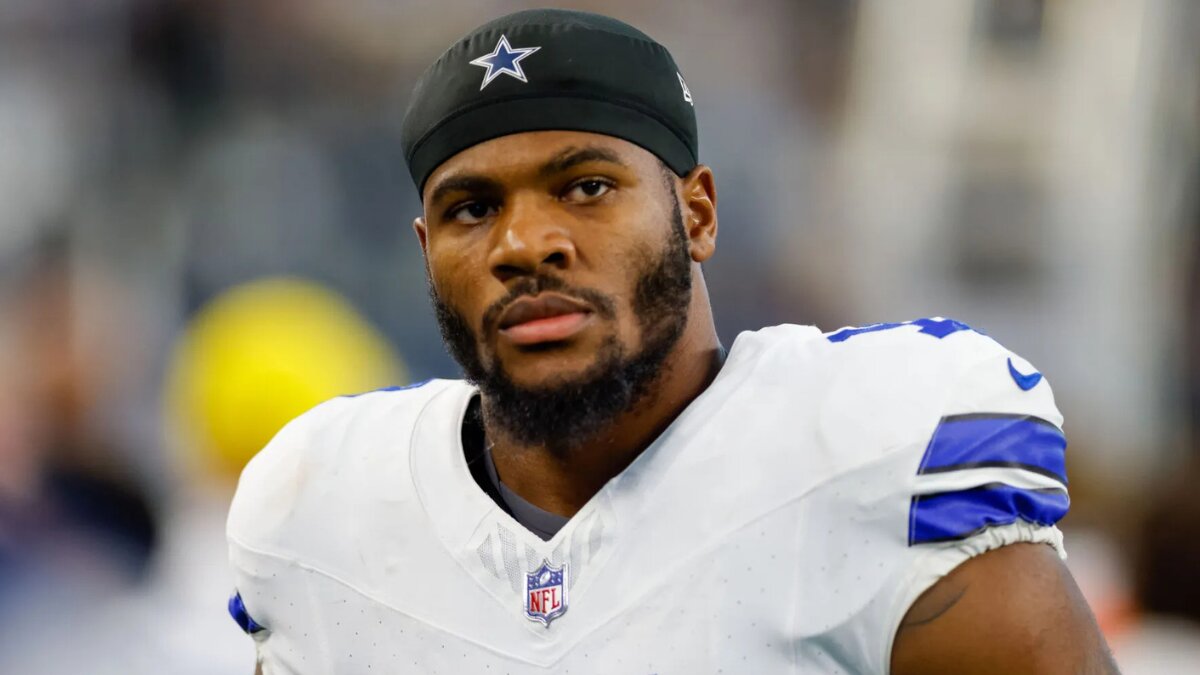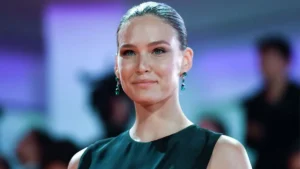Micah Parsons has never fit neatly into a single box. Yes, he’s an elite NFL linebacker—fast, physical, and instinctual in a way that has offenses scrambling to adjust. But Parsons isn’t just dominating on Sundays; he’s quietly redefining what it means to be a modern athlete. Part competitor, part brand-builder, part future mogul—he’s playing a much bigger game.
Since being drafted by the Dallas Cowboys in 2021, Parsons has done more than live up to expectations—he’s leapfrogged them. He’s won awards, built a fan base, attracted major endorsements, and carved out a presence in media that’s as authentic as it is strategic. And along the way, he’s been turning every headline and highlight into long-term value.
As of 2025, Parsons’ estimated net worth is $7 million, a figure that’s likely to skyrocket with his next contract and expanding business interests. But this isn’t just another athlete getting paid—it’s a story of foresight, discipline, and branding done right.
What sets Parsons apart isn’t just talent—it’s timing, intention, and the way he’s building toward something bigger than football. In the pages ahead, we’ll break down how he got here, what makes his financial rise so unique, and why Micah Parsons might be one of the NFL’s most quietly powerful success stories in the making.
The Rookie Contract That Sparked a Financial Trajectory
Draft Day Paycheck — Breaking Down the Numbers
When Micah Parsons was selected 12th overall by the Dallas Cowboys in the 2021 NFL Draft, the pick came with more than just prestige—it came with a lucrative rookie deal that set the financial foundation for his young career.
Parsons signed a fully guaranteed four-year, $17.1 million contract, including a $9.78 million signing bonus paid up front, according to Sportrac. That signing bonus alone made him an instant millionaire before he ever took a snap in the NFL. Spread across four seasons, his annual base salaries started modestly—just under $1 million as a rookie—but were heavily backloaded with roster bonuses and performance escalators.

Compared to his draft peers, Parsons’ deal was consistent with his slot, but the value of it skyrocketed as soon as he hit the field. While some rookies struggle to justify their contracts, Parsons arguably outplayed his deal within weeks. That’s the unique edge of NFL rookie contracts: if you produce like a superstar early, the return on investment—for both team and player—is immense.
In Parsons’ case, that investment has already paid dividends.
Rookie of the Year — Boosting On-Field Value and Off-Field Leverage
Micah Parsons didn’t just play well in his first NFL season — he exploded onto the scene with a ferocity rarely seen in rookies. From the moment he took the field, it was clear: the Cowboys had landed a game-changer. He didn’t need a learning curve—he was the curve.
By season’s end, Parsons had racked up 13 sacks and 84 tackles, earning NFL Defensive Rookie of the Year honors and a First-Team All-Pro selection — a rare feat for a first-year player. But beyond the stat sheet, he was everywhere: highlight reels, media segments, and Twitter threads filled with disbelief. Analysts called him a “defensive unicorn.” Fans bought his jersey in droves.
This kind of breakout created more than hype—it built leverage. Sponsors saw the buzz and wanted in. Within a year, Parsons transformed from promising prospect to marketable star. His rapid rise proved a timeless truth in sports marketing: elite performance creates immediate brand equity, even before contract talks begin.
In other words, Parsons didn’t just dominate the game—he shifted his financial ceiling.
Beyond the Gridiron: Parsons’ Growing Off-Field Empire
Brand Endorsements and Athlete Partnerships
As Micah Parsons carved out a dominant role on the field, brands quickly recognized his potential off of it. But his appeal isn’t just about sacks and speed—it’s about substance. Parsons represents a new wave of athletes who blend authenticity, relatability, and edge, making him a magnet for modern marketing campaigns.
In just a few seasons, he’s partnered with major names like Nike, Panini America, and Sleep Number, with each collaboration reflecting a strategic fit. Nike aligns with his elite athleticism, Panini with his growing collectible value, and Sleep Number taps into athlete wellness and recovery—a narrative Parsons has leaned into publicly. These aren’t one-off ads. They’re storytelling platforms.
What sets Parsons apart is his versatility. He’s not polished to the point of being generic; he’s real, young, and raw—in a way that resonates with both Gen Z fans and legacy brands looking to refresh their image. Sponsors aren’t just betting on current performance; they’re investing in a trajectory.
In essence, Parsons is a case study in how elite athletes now build brand portfolios in parallel with their playing careers. He’s not just cashing checks—he’s curating a personal brand that moves with cultural momentum.
Media Appearances and Personal Branding
Micah Parsons isn’t waiting until retirement to start shaping his legacy—he’s doing it in real time, one post, podcast, and mic’d-up moment at a time. Beyond the endorsements and accolades, he’s crafting a voice that fans actually want to hear, and that kind of influence is priceless in today’s media economy.
On Twitter/X, Parsons is unfiltered—talking football, reacting to highlights, and sometimes clapping back at critics. On Instagram, he blends glimpses of game-day life with family moments and behind-the-scenes content, keeping things personal without veering into cliché. And he’s leaned into his love of gaming, livestreaming on Twitch and dropping into conversations that show a different side of him—chill, competitive, and extremely relatable.
What’s compelling is the balance: Parsons doesn’t feel like he’s chasing clout. He comes off like the friend who’s just really good at football—and that authenticity resonates. His appearances on podcasts, whether NFL shows or pop-culture platforms, often reveal a charismatic, thoughtful personality that sponsors—and fans—want more of.
In a media landscape where personality drives profitability, Parsons is quietly mastering the art of being himself. And that’s turning into long-term value far beyond the field.
Smart Money Moves — Real Estate, Investments, and Business Ventures
For Micah Parsons, financial growth isn’t just about playing the game—it’s about understanding it. While some athletes wait until later in their careers to focus on wealth building, Parsons appears to be getting an early start, taking a strategic, measured approach to diversifying his earnings beyond his NFL contract.
Public records show that Parsons purchased a home in the Dallas area shortly after joining the Cowboys—an expected move, but one that suggests long-term roots and financial stability in a notoriously volatile industry. Unlike some players who favor lavish properties in multiple cities, Parsons seems grounded in practicality, keeping his real estate portfolio focused.
While he’s not flashy about his investments, Parsons has hinted at growing interests in cryptocurrency and tech-forward platforms. In interviews and livestreams, he has expressed curiosity about digital innovation—possibly signaling future ventures in areas such as gaming, NFTs, or esports. That said, there’s no indication he’s diving in recklessly. Parsons has often credited his financial advisor and inner circle for helping him avoid the pitfalls many young stars fall into.
He’s also shown signs of entrepreneurial interest, recently teasing apparel and lifestyle brand ideas tied to his motto and on-field energy. Nothing has been confirmed yet, but the groundwork is in place.
More important than any single asset is the theme emerging: intentionality. Parsons isn’t trying to be everywhere—he’s building quietly, with an eye on sustainability rather than hype. It’s a smart play for someone who already commands attention but doesn’t seem eager to burn through it.
In today’s financial climate for pro athletes, the real flex isn’t extravagance—it’s strategy. And by that standard, Parsons is already playing the long game.
Peer Group Check: How Micah Parsons Stacks Up Financially in the NFL
In terms of sheer talent, Micah Parsons already sits comfortably alongside the NFL’s defensive elite. But financially? He’s still catching up — for now.
Parsons’ estimated net worth in 2025 is around $7 million, according to Sportskeeda, fueled primarily by his rookie contract and a growing roster of endorsement deals. Compare that to T.J. Watt, who inked a four-year, $112 million extension in 2021, and Nick Bosa, whose five-year, $170 million deal made him the highest-paid defensive player in history. Their net worths hover in the $25–35 million range, significantly higher than Parsons’ at the moment.
But here’s the context: Watt and Bosa are both older, deeper into their careers, and well past their rookie deals. Parsons is still on his initial four-year contract, which the Cowboys are expected to extend or renegotiate soon—possibly with record-breaking numbers. And while he hasn’t reached their financial tier yet, his upward trajectory suggests he might exceed them in time.
Off the field, Parsons is gaining ground quickly. His marketing appeal and media presence outpace many of his peers, giving him a head start in brand building. Playing for the Dallas Cowboys, the league’s most valuable franchise, also boosts his visibility far more than defenders in smaller markets.
So while the current dollar-for-dollar comparison may tilt toward Watt and Bosa, Parsons is on a different kind of clock—one that’s running fast. If his performance and business savvy stay on track, he won’t just join the top financial tier of defenders—he may define it.
Micah Parsons’ Rise from Harrisburg to NFL Stardom
Early Life and College Dominance
Before the NFL lights and national headlines, Micah Parsons was a kid from Harrisburg, Pennsylvania, driven by raw talent and relentless ambition. Growing up in a working-class neighborhood, Parsons faced the kind of challenges that shape resilience—tight resources, high expectations, and a constant need to prove himself. Football wasn’t just a game; it was a way forward.
By high school, he was already a local legend—an unstoppable force at both linebacker and running back. His highlight reels went viral, drawing attention from powerhouse programs nationwide. But it was at Penn State where Parsons began to transform from elite recruit into NFL-caliber disruptor.

Even before his junior year, scouts were circling. Coaches spoke of his “football IQ” and freakish athleticism with reverence. He wasn’t just good—he was different. Parsons didn’t just dominate plays—he dictated games. By the time he declared for the draft, his future was less a question of “if” and more a matter of “how high.”
Betting on Himself: The Opt-Out That Paid Off
In 2020, with the COVID-19 pandemic casting uncertainty over college sports, Micah Parsons made a decision that raised eyebrows across the football world: he opted out of his junior season at Penn State. At the time, it was a bold and risky call. Some questioned whether sitting out would hurt his draft stock. Others wondered if he was stepping away too soon.
But for Parsons, it wasn’t hesitation—it was strategy.
Rather than risk injury or inconsistent playing time in an uncertain season, he chose to focus on training, refining his game, and preparing for the next level. The move showed rare maturity and a long-term mindset, especially for a player barely in his twenties. And when draft day arrived, the gamble paid off: Parsons went 12th overall, proving that his talent—and confidence in it—spoke louder than any question marks.
In hindsight, it wasn’t just a smart decision. It was a defining moment of self-belief.
What Micah Parsons’ Career Taught Me About Wealth and Discipline
I remember the first time I saw Micah Parsons play. It was a Cowboys game during his rookie year, and he blitzed off the edge so fast I had to rewind the broadcast—twice—just to process what I’d seen. That kind of speed and instinct doesn’t just happen. It’s built, honed, and repeated behind the scenes. And the more I followed his story, the more I realized: Parsons isn’t just playing the game—he’s mastering the life around it.
What strikes me most about Micah isn’t the sacks or the Pro Bowls. It’s the discipline. Opting out of his junior year at Penn State? That took vision. Staying grounded in Dallas while others chase clout across coasts? That takes maturity. While many young athletes flash wealth for the ‘Gram, Parsons seems to be thinking 10 years ahead.
I once heard him say in an interview, “I want to build a legacy that lasts after I’m done playing.” That stuck with me. He’s not obsessed with being famous—he’s focused on being smart. That’s a lesson more of us—whether we’re in sports, business, or just figuring things out—could take to heart.
Watching Parsons grow, both as a player and a man, has made me rethink what success looks like. It’s not just about the stats. It’s about consistency, character, and knowing when to take a calculated risk. He’s betting on himself—and winning—not because he’s lucky, but because he’s prepared.
In a world that often rewards flash over foundation, Micah Parsons is a reminder that staying grounded is sometimes the most powerful move of all.
What’s Next? Projecting Parsons’ Path to Generational Wealth
If Micah Parsons has already built a solid financial foundation, what comes next could launch him into the stratosphere.
By 2025, Parsons is nearing the end of his rookie contract—a moment that’s set to redefine his earning potential. Given his production and impact, analysts are projecting a massive extension, possibly north of $30 million per year, which would place him among the highest-paid defensive players in NFL history. It’s not just speculation—it’s market logic. Teams pay for disruption, and Parsons delivers it in abundance.
But what makes Parsons a true candidate for generational wealth isn’t just the paycheck—it’s his vision beyond football. He’s hinted at interests in philanthropy, particularly in youth programs in Pennsylvania, and there’s growing buzz around future ventures in media or broadcasting, where his charisma and insight could shine.
He’s also shown curiosity in entrepreneurship, and with his understanding of branding, don’t be surprised if he launches something of his own—be it apparel, tech, or even a production company. Following the blueprint of stars like LeBron James or Von Miller, Parsons seems intent on owning parts of the industries he touches.
Ultimately, it’s his blend of self-awareness, discipline, and timing that sets him up to turn short-term riches into long-term legacy. If the first chapter of his financial story was about earning respect, the next may be about building an empire.
From Disruptor to Mogul — The Evolution of Micah Parsons
Micah Parsons’ story isn’t just about how much money he’s earned—it’s about how he’s earned it. From his breakout rookie season to his rising profile as a media personality and budding entrepreneur, Parsons is charting a path that goes well beyond football’s playbook.
He’s gone from disruptor on the field to strategic thinker off of it, turning talent into influence and influence into opportunity. Every move—whether opting out of college, choosing the right endorsements, or staying grounded in his personal life—reflects a broader plan rooted in identity, discipline, and long-term vision.
Parsons isn’t just building wealth. He’s building a brand. A blueprint. A legacy.
In today’s athlete economy, where visibility is currency and character is capital, Micah Parsons stands out not just for what he does—but for how he does it. His evolution reminds us that true financial success doesn’t come from the biggest deal, but from the clearest direction.
And if this is just the beginning, the mogul era of Micah Parsons may be his most exciting chapter yet.
Mohit Wagh is the co-founder of The Graval with over 10 years of experience in SEO and content strategy. He specializes in crafting data-driven, authoritative content that blends cultural insight with digital growth.





2 thoughts on “Inside Micah Parsons’ Growing Fortune: From Rookie Contract to Future Endorsement Giant”